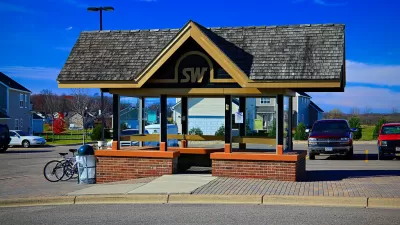Just how does a transportation bill that doesn't increase fuel taxes or introduce new user charges, and maintain the same level of spending reduce the deficit by $16.3 billion? Ask the Congressional Budget Office.
Rather than a straightforward gas tax increase to sustain the current level of transportation spending, the bill, known as H.R. 4348 or MAP-21, relies on an incredible amount of budget transfers and redirecting of funds from different revenue sources which may or may not have to do with transportation. Conclusion: "CBO estimates that enacting H.R. 4348 would reduce budget deficits over the 2012-2022 period by $16.3 billion."
According to Taxpayers For Common Sense (TCS), "the $16.3 billion includes $11.2 billion in increased premiums from the Pension Benefit Guaranty Corporation – which is itself $26 billion in debt!" And then one one must disregard the "$18.8 billion transfer from the Treasury to the Highway Trust Fund! Or the transfer of $2.4 billion from the Leaking Underground Storage Tank (LUST) Fund to the Highway Trust Fund!"
When TCS does the math for the new bill, they conclude that it will increase the deficit by 13.7 billion.
In their Statement Opposing Transportation Omnibus Bill, TCS accuses lawmakers of relying "on a variety of budgetary smoke and mirrors."
According to TCS, the revenue gained from changes in the Pension Benefit Guaranty Corporation are "ludicrous at best." But even if the new revenue is correctly determined, why is it directed to the Highway Trust Fund that historically has been funded from highway user fees to pay for the nation's transportation needs?
Thanks to Deron Lovaas
FULL STORY: Congress’ Tortured Math

Planetizen Federal Action Tracker
A weekly monitor of how Trump’s orders and actions are impacting planners and planning in America.

Maui's Vacation Rental Debate Turns Ugly
Verbal attacks, misinformation campaigns and fistfights plague a high-stakes debate to convert thousands of vacation rentals into long-term housing.

San Francisco Suspends Traffic Calming Amidst Record Deaths
Citing “a challenging fiscal landscape,” the city will cease the program on the heels of 42 traffic deaths, including 24 pedestrians.

Amtrak Rolls Out New Orleans to Alabama “Mardi Gras” Train
The new service will operate morning and evening departures between Mobile and New Orleans.

The Subversive Car-Free Guide to Trump's Great American Road Trip
Car-free ways to access Chicagoland’s best tourist attractions.

San Antonio and Austin are Fusing Into one Massive Megaregion
The region spanning the two central Texas cities is growing fast, posing challenges for local infrastructure and water supplies.
Urban Design for Planners 1: Software Tools
This six-course series explores essential urban design concepts using open source software and equips planners with the tools they need to participate fully in the urban design process.
Planning for Universal Design
Learn the tools for implementing Universal Design in planning regulations.
Heyer Gruel & Associates PA
JM Goldson LLC
Custer County Colorado
City of Camden Redevelopment Agency
City of Astoria
Transportation Research & Education Center (TREC) at Portland State University
Jefferson Parish Government
Camden Redevelopment Agency
City of Claremont



























